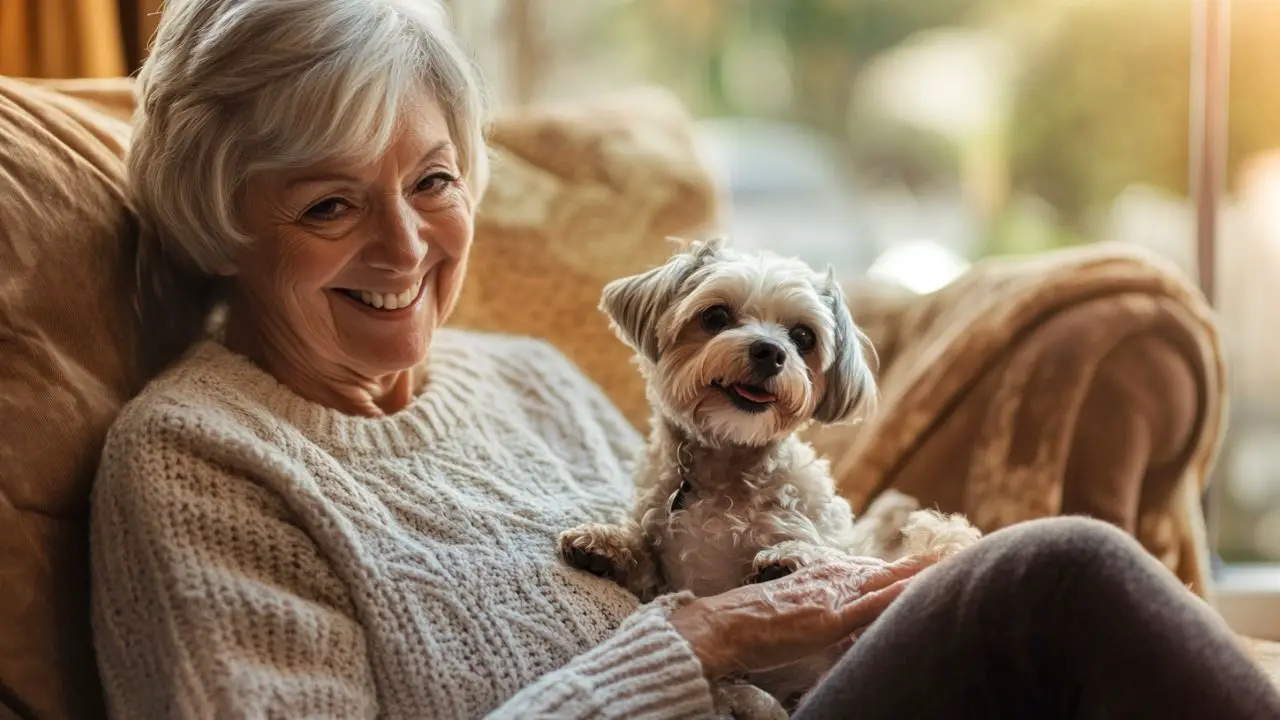As we age, companionship becomes increasingly important for our overall well-being and quality of life.
For many seniors, small dogs offer the perfect solution, providing love, comfort, and numerous health benefits.
This article explores the various advantages of small dog ownership for older adults, highlighting why these pint-sized pooches can make a big difference in seniors’ lives.
Manageable Size and Care
Small dogs are often easier for seniors to handle and care for compared to their larger counterparts.
Their compact size makes them ideal for apartments or smaller living spaces, which are common among older adults.
Smaller breeds typically require less food, making them more economical to maintain on a fixed income.
Grooming needs are often less demanding, with shorter coats that are easier to manage for those with limited mobility.
Exercise and Physical Activity
While all dogs need exercise, small breeds generally have lower energy requirements.
Short walks and indoor play sessions can often meet their exercise needs, making them suitable for seniors with limited mobility.
These manageable exercise routines can help seniors stay active without overexertion.
Even simple activities like tossing a toy or gentle indoor games can provide sufficient physical activity for both the dog and the owner.
Emotional Support and Companionship
Small dogs excel at providing emotional support and companionship, often forming strong bonds with their owners.
Their affectionate nature can help combat feelings of loneliness and isolation that some seniors may experience.
The presence of a small dog can offer a sense of purpose and routine, which is beneficial for mental health.
Many small breeds are known for their loyal and attentive personalities, providing constant companionship throughout the day.
Stress Reduction and Mental Health
Interacting with small dogs has been shown to reduce stress levels and lower blood pressure in older adults.
The simple act of petting a dog can release feel-good hormones like oxytocin, promoting a sense of calm and well-being.
Caring for a small dog can provide a welcome distraction from health concerns or other worries.
The unconditional love of a pet can boost self-esteem and create a positive outlook on life.
Social Interaction and Community Engagement
Owning a small dog can encourage seniors to engage more with their community.
Dog walking, even for short distances, provides opportunities to meet neighbors and other dog owners.
Pet ownership can be a great conversation starter, helping seniors connect with others who share similar interests.
Some communities offer dog-friendly events or pet therapy programs, providing additional social opportunities for seniors and their furry companions.
Safety and Security
Despite their small size, many little dogs have a big bark, which can deter potential intruders.
Their alert nature makes them excellent at notifying their owners of any unusual activity.
Some small breeds can be trained as hearing dogs, assisting seniors with hearing impairments.
The presence of a dog can provide a sense of security and comfort, especially for seniors living alone.
Adaptability to Lifestyle Changes
Small dogs are often more adaptable to changes in living situations, which can be common for seniors.
They can easily transition between homes or even accompany their owners in assisted living facilities that allow pets.
Their portable size makes them ideal travel companions for seniors who enjoy taking trips or visiting family.
In case of health emergencies, small dogs are easier to arrange care for or temporarily rehome if necessary.
Longevity and Commitment
Many small dog breeds have longer lifespans compared to larger dogs, providing companionship for many years.
This longevity can be comforting for seniors, offering a stable presence in their lives.
The commitment to a small dog can provide structure and purpose, which is beneficial for mental and emotional well-being.
Long-term pet ownership can create a deep bond and a sense of family for seniors.
Health Monitoring and Assistance
Some small dogs can be trained to assist with basic tasks or to alert caregivers in case of emergencies.
The routine of caring for a pet can help seniors maintain their own health routines, such as regular exercise and medication schedules.
Observant small dogs may notice changes in their owner’s behavior or health, potentially alerting to issues early.
The responsibility of pet care can help seniors stay mentally sharp and maintain a sense of independence.
Conclusion: Small Dogs, Big Impact
The benefits of small dogs for seniors are numerous and significant, ranging from physical health improvements to emotional well-being.
These pint-sized companions offer love, support, and a zest for life that can greatly enhance the golden years.
For seniors considering pet ownership, a small dog could be the perfect addition to their lives, bringing joy, purpose, and unconditional love.
If you or a senior loved one is considering getting a small dog, be sure to research breeds that match your lifestyle and consult with a veterinarian or local shelter for guidance.
The right small dog can make a big difference in a senior’s life, proving that good things truly do come in small packages.
Share this article on Facebook to spread the word about the amazing benefits of small dogs for seniors!
Let’s help more older adults discover the joy and companionship that these wonderful little pets can bring to their lives.
SHARE now with your friends!
- Hero Farm Dog Survives Epic Battle with Coyote Pack - December 9, 2024
- The 10-Minute Bedtime Routine That Changed My Dog’s Sleep Forever - November 29, 2024
- Creating a Safe Space for Nervous Pets: Your Guide to Pet-Friendly Havens - November 25, 2024

